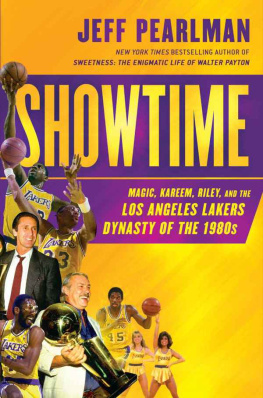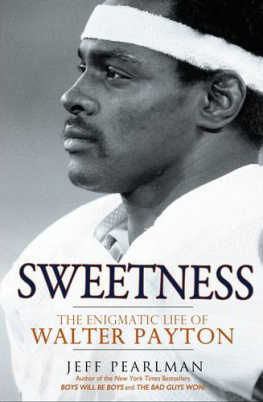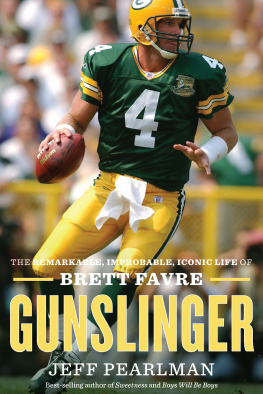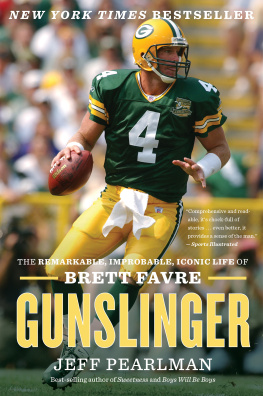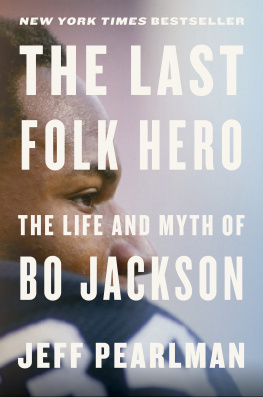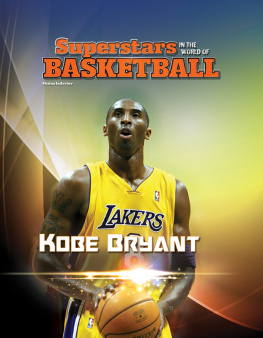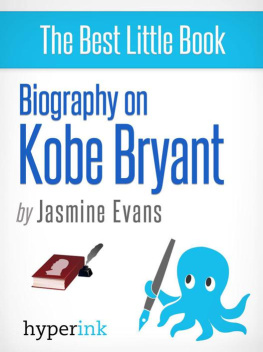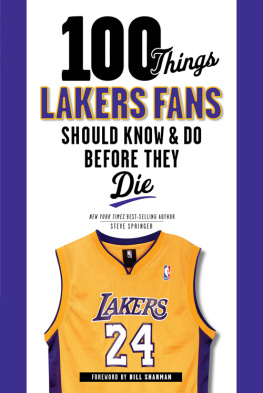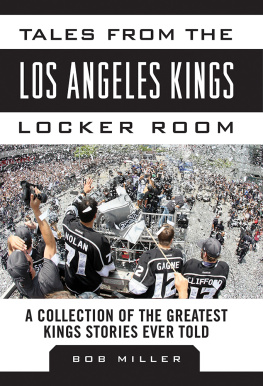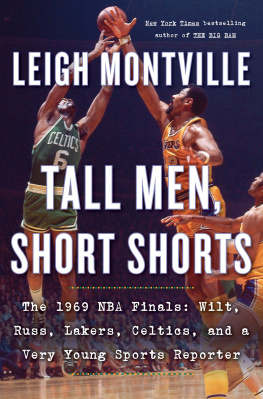ALSO BY JEFF PEARLMAN
Sweetness: The Enigmatic Life of Walter Payton
The Rocket That Fell to Earth
Boys Will Be Boys
Love Me, Hate Me
The Bad Guys Won!

GOTHAM
Published by the Penguin Group
Penguin Group (USA) LLC
375 Hudson Street
New York, New York 10014

USA | Canada | UK | Ireland | Australia | New Zealand | India | South Africa | China
penguin.com
A Penguin Random House Company
Copyright 2014 by Jeff Pearlman
Penguin supports copyright. Copyright fuels creativity, encourages diverse voices, promotes free speech, and creates a vibrant culture. Thank you for buying an authorized edition of this book and for complying with copyright laws by not reproducing, scanning, or distributing any part of it in any form without permission. You are supporting writers and allowing Penguin to continue to publish books for every reader.
Part-opener photographs on pages 147 and 363 are by Lipofsky Basketballphoto.com.
Gotham Books and the skyscraper logo are trademarks of Penguin Group (USA) LLC.
LIBRARY OF CONGRESS CATALOGING-IN-PUBLICATION DATA
Pearlman, Jeff.
Showtime : Magic, Kareem, Riley, and the Los Angeles Lakers dynasty of the 1980s / Jeff Pearlman.
pages cm
Includes bibliographical references and index.
ISBN 978-1-59240-755-2 (hardback)
ISBN 978-0-698-14861-1 (eBook)
1. Los Angeles Lakers (Basketball team)History. I. Title.
GV885.52.L67P43 2014
796.323'640979494dc23 2013026263
While the author has made every effort to provide accurate telephone numbers, Internet addresses, and other contact information at the time of publication, neither the publisher nor the author assumes any responsibility for errors or for changes that occur after publication. Further, the publisher does not have any control over and does not assume any responsibility for author or third-party websites or their content.
Version_1
CONTENTS
PART ONE PART TWO PART THREE
To Catherine, Casey, and Emmettmy three diamonds.
And then a gatorsaur ate them.
The end.
PROLOGUE
S pencer Haywood?
The name hangs there, awkwardly suspended in midair as if attached to the string of a balloon. I am looking at Jack McKinney. Jack McKinney is looking at me. It is a warm February day in Naples, Florida. We are on an enclosed patio. Small glasses of ice water have been served. A couple of birds chirp. The wind whistles gently in the background.
I am the journalist, here to interview the greatest NBA coach 999 of 1,000 basketball fans have never heard of. Jack McKinney is here to answer my questions. And yet, he cant. Well, he cansort of. The replies start, then stutter, then stop, then start again. The thoughts seem on point, turn left, hit a traffic circle and wind up somewhere in Bethesda. There are, he insists, wonderful basketball memories circulating throughout his seventy-seven-year-old brain; joyful tales of his eight years as the head coach at Saint Josephs College; serving as an assistant with the world champion Portland Trail Blazers in 1977; tender moments with Kareem Abdul-Jabbar and Bill Walton and Jamaal Wilkes and Jack Ramsay. There was this one game... he saysthen stops. Just stops.
Whats your name again? McKinney suddenly says, his eyes gazing downward.
Jeff, I say. Jeff Pearlman.
Thats right. I wrote your name down five different times before you came here. Its embarrassing, the way my memory...
From the next room, his wife, Claire, speaks up. No sob stories, Jack! she says. Thats not the way we look at life.
With that, Jack McKinney refocuses. He glances at me, rubs his chin, looks down, then back up. What were we talking about? he asks.
Spencer Haywood, I say. You coached him...
I coached Spencer Haywood? Are you certain?
On the table, I have placed a manila folder. It is labeled JACK MCKINNEY in brown marker. Inside are photocopies of thirty or so articles, chronicling the rise and fall of a man who, in the summer of 1979, was hired by the Los Angeles Lakers to coach a team that featured Abdul-Jabbar, the five-time NBA MVP; Haywood, a four-time NBA All-Star; as well as a rookie point guard from Michigan State named Earvin (Magic) Johnson. The clippings tell the story of a forty-four-year-old basketball lifer finally getting his shot, of a humble and decent person brought in to revive a franchise in need of a spark. At his introductory press conference on July 30, a beaming McKinney admitted to the assembled Los Angeles media that his was a relatively simple basketball philosophy. Id like to run very much more than we have here, a constant running game, he said, standing behind a podium inside the Forum. Id like a moving offense, rather than having everyone standing around watching Kareem all the time and putting pressure on him.
McKinney was immediately embraced by his players. He ignored those who said Johnson, a 6-foot-9 ball wizard, was better suited to play power forward than point guard. He spoke regularly with the mercurial Haywood, a thirty-year-old journeyman forward with unlimited talent but a penchant for moody self-confinement. He would stop practices to confront and advise Abdul-JabbarAnd nobody, and I mean nobody, ever spoke to Kareem like that, said Michael Cooper, the Laker guard. In short, McKinney was the perfect coach at the perfect time for the perfect team. He created Showtime, said Norm Nixon, Los Angeles All-Star guard. That should never be forgotten. You can talk about me and Kareem and Earvin and Pat Riley all you want. But Jack McKinney created Showtime.
Yet now, as we sit here on a patio, sipping iced water to dull the awkwardness, the man who created Showtime barely remembers creating Showtime. The Lakers jumped out to a 9-4 start that season, prompting Sports Illustrated s Bruce Newman to write a glowing piece titled Doing It All for LA. Though McKinney was personally as glitzy as a truck stop, fans loved the way his team played. Under Jerry West, the legendary Laker guard who was the head coach for the three previous seasons, Los Angeles was reduced to being a one-trick pony: See Kareem, wait for Kareem, pass to Kareem, watch Kareem shoot and hope the ball goes in. Not very imaginative, said Nixon. Stilted.
Suddenly, however, the Lakers were neon lights along the Sunset Strip: pow! and boom! and wow! Johnson and Nixon formed the NBAs fastest backcourt. Wilkes, the smooth small forward, was gliding toward the rim. Haywood seemed revived and Abdul-Jabbar, the stoic, standoffish icon, was smiling and laughing and having the time of his life. The Forum, once the land where enthusiasm came to die, was alive. The word is fun , said Haywood. We were really fun.
Back in the day, when the NBA was still relatively bare-boned, teams employed one head coach and one assistant. McKinneys sidekick was Paul Westhead, another young Philadelphia guy who played for his boss at Saint Josephs before coaching at La Salle College for nine years. Like McKinney, Westhead enjoyed run-and-gun basketball, lengthy intellectual discussions about the sports intricacies and, when time allowed, friendly games of tennis.
On the morning of November 8, 1979, the phone in McKinneys Palos Verdes home rang. This was the Lakers first off day of the young season, and Westhead was itching for some time on the nearby clay court. The call stirred McKinney from his sleep.
Want to play some tennis? Westhead asked.
McKinney grunted sure .
Ive got the court for two hours, Westhead said. We can play singles at ten, maybe some doubles with the girls at eleven.
Next page
